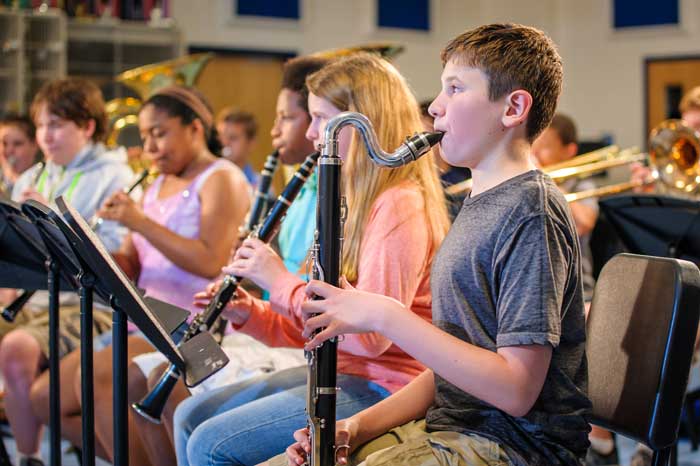July 06, 2015
10 Lessons Your Child Will Learn in Marching Band


Marching band is more than just a school activity – it’s an adventure where your child learns a different language and new skills that will last them a lifetime. Not only does marching band exercise the mind and body, but also it encourages friendships, cultivates creativity and provides students with a unique opportunity to grow as individuals.
The foundations and lessons gained from marching band make it an extremely valuable learning experience for children of all ages. From becoming more disciplined to understanding the complexities of working as a team, here are ten valuable life lessons your child will learn during their time in marching band.
1. Ability to Multi-Task
One of the first things your child will learn while in marching band is to multi-task. Take marching for example, not only is marching in set formations a challenge, but so is playing an instrument in unison to memorized music!
Because this complex task is performed daily by marching band members, this learned ability to multi-task will come in handy later in your child’s life and will become crucial for day-to-day success.
Some benefits of multi-tasking include:
- Increased productivity
- Better time-management
- Higher cognitive flexibility, resulting in greater creativity
- Better reaction to complex tasks
These skills benefit your child and will be especially useful when they go on to juggle various college courses, work on different projects for enterprise-level meetings and when they eventually enter parenthood.
2. A Sense of Responsibility
Responsibility means being dependable, making good choices and taking accountability for your actions. When it comes to marching band, each member is held accountable for various responsibilities. A color guard member, for example, is normally responsible for memorizing their flag work, while a tuba player has the responsibility of memorizing the music they need to perform.
Responsibility is essential to establishing a strong work ethic, leading a healthy lifestyle and fostering independence. Taking accountability also encourages student learning and aids in better academic performance and achievements.
By being accountable for their own responsibilities, your child will become a more independent, self-reliant and responsible member of society.
New to band? Check out our First-Time Parent’s Guide To Band & Orchestra
3. Newfound Discipline
If you’ve never been in a marching band, you might not realize exactly how disciplined marching band members are. Did you know that band leaders use phrases like “band ten hut” to instantaneously command the attention of the entire marching band? Additionally, band members are taught to respect each other in the same way they’d respect their band leader or parent.
Discipline is the bridge between goals and accomplishment, which is why the most successful people in life exert discipline on a daily basis. It also aids in the development of self-motivation, self-control, personality and enhances their decision-making processes.
By joining the marching band, your child will develop self-discipline, allowing them to become emotionally and socially mature adults in the future. Because of this, being disciplined enough to listen, understand and respect orders is not only critical in marching band, but also critical in life.
4. Understanding Teamwork
One of the best things about marching band is that each individual member is as important as the next. As long as they are able to work with each other as a team, there’s no such thing as having too many people. While each member has their own responsibilities, it all comes together to form one entity: a marching band.
In the process of learning each movement and memorizing each note, your child will also bond with the other marching band members, leading them to accomplish their overall goal. By working as a team, children also develop important life skills, such as problem solving, leadership and creative thinking.
As a result, your child could develop higher levels of:
- Self-esteem
- Empathy
- Communication
- Respect for others
Teamwork is also one of the most important skills children need to get ahead in the world today and is one of the most sought-after skills in education and the workplace. A survey conducted by the Association of American Colleges and Universities showed that more than 80% of employers look for collaboration skills in new hires.
Because of these reasons, teamwork is not only valuable to the development of your child but also to their success later in life.
5. Importance of Commitment
The marching band is a time-consuming, all-weather sport. Your child will take part in uncomfortable summer rehearsals before school starts in the fall and will have to pile on winter coats and scarves during early winter performances. By doing so, your child is taught the importance of commitment, hard-work and perseverance.
Commitment helps individuals stick to their goals despite during the good times, and the bad. By learning commitment in the marching band, your child will learn to successfully achieve and maintain goals despite any hurdles that may come up along the way. Even when the going gets tough, marching band members learn to encourage one another to keep going. This endurance and commitment can be translated to school projects, employee groups and interpersonal relationships.
6. Time Management
Time-management is important for prioritizing tasks and accurately judging the amount of time needed to complete them. And, any marching band member can agree that being part of a marching band can be a huge time commitment. Between two-hour rehearsals two to three days a week and performing at football games, high school exhibitions and competitions, finding the time for homework, after-school jobs and other activities can be difficult.
When your child must juggle a busy schedule and various activities, time-management will be vital to tackling each one. This ability is important for your child to learn to prioritize their time and manage their own schedules. By learning to manage their time effectively, child’s focus and productivity will improve over the long-term.
As a member of the marching band, your child will quickly learn how to manage their time – a skill many adults continue to have problems with later in life.
7. Losing Gracefully
Losing is an important and inevitable part of life, as well as the only way for kids to learn from their mistakes and think about ways to improve in the future. As a result, your child will also learn to lose with grace in front of others and learn to handle failure.
Marching competitions are a great way for your child to learn this skill. Although winning a marching competition is a great feeling, members come to realize that winning isn’t anything. Marching up to salute the head judge at a competition only to receive an honorable mention award in front of an entire stadium of people is a lesson in humility, and one that will stick with your child through each and every loss they’ll experience in life.
Because losing is necessary to success, it’s important that your child learn to cope with the experience earlier in life. From break-ups to lost jobs, being able to accept loss is necessary to roll with the punches and move on.
8. Personal Growth
Personal growth is arguably one of the most important things children need to learn. Studies have even shown that individuals who prioritize their own growth and development are likely to be more successful, and are happier and healthier in life. For students who are especially shy or afraid of performing in front of others, being in the marching band can be especially helpful for calming their fears and boosting their self-confidence. Each time your child takes the stage or gears up for a performance, they’ll gain a little bit more confidence.
Additionally, by sharing in the same experiences and downfalls with a group of like-minded individuals, your child will have access to a built-in support system from which they can personally grow and develop. This social development is important for fostering deep friendships and is necessary for your child to relate and cooperate with others.
9. Presenting Themselves
How children see themselves can affect every aspect of their lives, especially as they develop their own sense of self-awareness. Because appearance is a vehicle for self-expression, the way your child presents themselves is vital to social signaling. If your child dissatisfied with their body, it could lower their self-esteem and impact their ability to meet people and make friends.
However, as a marching band member, your child will be expected to present themselves in a professional manner, including a clean, pressed uniform and impeccable posture. By having to pay attention to how they present themselves to other people at an early age, they’ll also feel more prepared for college consultations, job interviews and any other instance where looking and feeling their best will be essential.
10. Leadership
Every parent wants their child to be successful, but that can sometimes be difficult to accomplish. One of the most important skills one can learn is leadership, especially since it can play a huge role in accomplishing one’s goals.
Developing leadership skills promotes:
- Creative problem solving
- Self-awareness
- Independent decisions and choices
- Teamwork
- Competence
If you think there aren’t any leadership opportunities in a marching band, think again. From ranked squad leaders to drum majors, there are plenty of ways your child can practice their leadership skills in a marching band environment.
While leadership skills may come naturally to some, other children require the right platform and, for some, that platform is a marching band.
Updated: February, 28, 2022







